By Seth Grimes.
Someone asked me earlier this week, “What is Montgomery County doing really well?”
My answer: We are a welcoming, compassionate, and inclusive community. That’s the Montgomery Way.
The Montgomery Way: Our $312 million Health & Human Services budget funds an array of programs that assist our most vulnerable neighbors. Our “inclusionary zoning” approach to land use has made the County an affordable housing leader. And we stand with our immigrant neighbors, including undocumented individuals, in the face of Trump Administration attacks and Republican congressional complicity.
Let’s credit County Executive Ike Leggett with shaping this ethos, which includes a policy of public-safety non-cooperation with federal immigration authorities. Yet attacks on immigrants are intensifying, nationally and here in the Washington DC area. We must respond. Let’s consider two ways we can strengthen local protections.
Montgomery County should fund deportation legal defense and pass a Community Trust Act that formalizes ICE non-cooperation as County law, a step promoted by CASA de Maryland.
Momentum toward these local steps has been building over the course of Donald Trump’s year in office. A start: I recall a productive Takoma Park Mobilization meeting with County Councilmembers Marc Elrich and George Leventhal last February at my office, to broach both ideas. (I’m a Mobilization co-founder; the Mobilization grew out of a November 11, 2016 Rally for Community, taking place the Friday after Trump’s election, that I initiated to show solidarity with immigrant and Muslim neighbors.)
Progress can take time, however; in the last year, the threat to undocumented neighbors has only grown. It’s time to act.
A Montgomery County Deportation Defense Coalition is pushing for action, for funding in the County’s FY19 budget. The Coalition’s argument: “Immigrants in deportation proceedings are not entitled to court-appointed counsel. This means that immigrants who cannot afford to hire an attorney must represent themselves. Per a nationwide study by the University of Pennsylvania School of Law, represented immigrants are 5.5 times more likely to win their case than non-represented immigrants.” Implicit is that it is our collective duty to stand with and support our neighbors facing deportation.
Public deportation legal defense funding could support and expand the work done by organizations such as Kids In Need of Defense (KIND), which seeks to ensure that every child in the immigration system has a lawyer. Ayuda and the Capital Area Immigrants’ Rights (CAIR) Coalition also provide legal services to individuals facing deportation. We’re not talking about a new assignment for the County Attorney.
There’s more we can do. A new Maryland Legislative Coalition, working closely with ACLU PeoplePower, is backing the Maryland SAFE Act, currently before the General Assembly. SAFE stands for Supporting All Families Everywhere; PeoplePower is an initiative dedicated to grassroots action in defense of civil liberties. The SAFE Act, HB 1461, was introduced Delegate Ana Sol Gutierrez. It would limit Immigration cooperation by state authorities and provide immunity and indemnification for officials who do not cooperate. SAFE is another form of deportation legal defense. I testified for 2017’s failed Maryland Law Enforcement and Governmental Trust Act, and I support this year’s very similar SAFE Act in addition to local, Montgomery County action.
Deportation legal defense is the Montgomery Way, a set of concrete steps we can and should take to ensure that ours remains a welcoming, compassionate, and inclusive community. The Trump Administration is targeting our immigrant neighbors. Deportation legal defense is an important way we can stand up and fight back.
Seth Grimes is a candidate for County Council At-Large.







